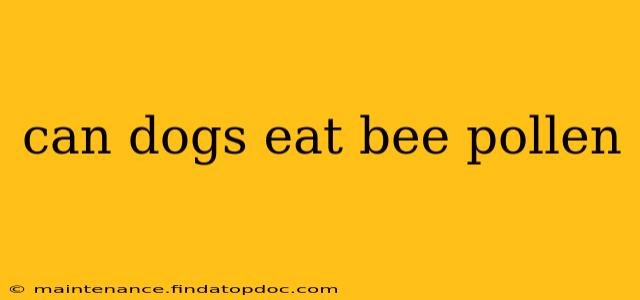Bee pollen, a nutritional powerhouse for humans, sparks curiosity among pet owners: can dogs safely enjoy this natural supplement? The short answer is nuanced – it depends. While bee pollen offers potential benefits, it also carries risks, making informed decision-making crucial for canine health. This guide explores the pros, cons, and precautions regarding bee pollen consumption for your furry friend.
Is Bee Pollen Safe for Dogs?
The safety of bee pollen for dogs isn't definitively established. While some studies suggest potential benefits, there's limited research specifically on canine consumption. The potential advantages need to be carefully weighed against potential risks. It's vital to remember that every dog is different, and reactions can vary significantly.
Potential Benefits of Bee Pollen for Dogs
Some proponents suggest that bee pollen may offer certain benefits for dogs, including:
- Improved Energy Levels: Bee pollen is rich in vitamins, minerals, and antioxidants, potentially boosting energy. However, this isn't scientifically proven in dogs.
- Enhanced Immune System: Its nutrient profile might support a healthy immune system, but more research is needed to confirm this effect in canines.
- Improved Coat and Skin Health: The vitamins and antioxidants could contribute to a healthier coat and skin, but this is largely anecdotal.
Potential Risks and Side Effects of Bee Pollen for Dogs
Despite potential benefits, several risks are associated with feeding bee pollen to dogs:
- Allergies: Bee pollen is a common allergen, and dogs can experience allergic reactions ranging from mild skin irritation to severe anaphylaxis. Symptoms might include itching, hives, vomiting, diarrhea, or difficulty breathing.
- Gastrointestinal Upset: The high concentration of nutrients can cause digestive issues like diarrhea, vomiting, and stomach upset, particularly if given in large quantities.
- Toxicity: In rare cases, bee pollen may contain pesticides or other contaminants that could be toxic to dogs.
- Interactions with Medications: Bee pollen may interact negatively with certain medications. Consult your veterinarian before introducing it to your dog's diet, particularly if they are on any prescription drugs.
What to Do if Your Dog Eats Bee Pollen
If your dog ingests bee pollen, monitor them closely for any adverse reactions. Watch for signs of allergies (itching, hives, swelling), gastrointestinal distress (vomiting, diarrhea), or respiratory problems (difficulty breathing, coughing). If you notice any concerning symptoms, contact your veterinarian immediately.
H2: How Much Bee Pollen Can a Dog Eat?
There's no established safe dosage of bee pollen for dogs. It's best to avoid giving it altogether unless under the explicit guidance of your veterinarian. If your vet approves its use, they will advise on the appropriate dosage based on your dog's size, breed, and health condition.
H2: Can Puppies Eat Bee Pollen?
Puppies are generally more sensitive than adult dogs. Therefore, it is strongly advised against giving bee pollen to puppies due to the increased risk of allergic reactions and digestive upset.
H2: Are there Alternatives to Bee Pollen for Dog Health?
Instead of bee pollen, focus on providing your dog with a balanced diet rich in whole foods, including high-quality protein, fruits, and vegetables appropriate for dogs. Consult your veterinarian regarding any dietary supplements your dog might need to support specific health concerns.
Conclusion:
While bee pollen might offer potential health benefits, the risks outweigh the rewards for most dogs. Due to the lack of conclusive scientific research and the potential for adverse reactions, it's best to err on the side of caution and avoid giving bee pollen to your canine companion. If you have concerns about your dog's health or diet, always consult your veterinarian for personalized advice. Remember, a balanced diet and regular veterinary check-ups are crucial for maintaining your dog's optimal health and well-being.
